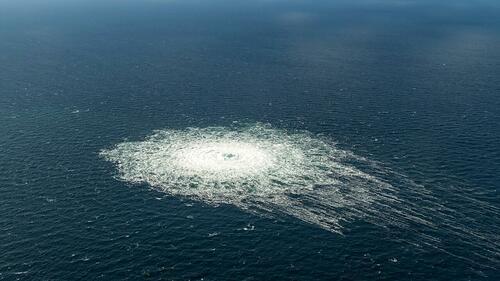Steve Bull's Blog, page 185
October 1, 2022
The Curious Whodunit of Nordstreams 1 and 2

The old world broke this week. It was blown up cynically by someone who thought this would advance their agenda the most.
The act of vandalizing a major piece of physical infrastructure, targeting civilian populations, isn’t unprecedented in history, but it does signal that everything we thought we knew about the rules of the current game was wrong.
Well, for most people anyway.
When I spoke in June at the Ron Paul Institute Conference on Foreign Policy I described the game of geopolitics as a seven-player game of the ancient Chinese game, Go.
And in that game we’ve reached an inflection point where some factions are coalescing and others are splintering. The faction that is unwilling to compromise on their future is the most dangerous one at the table.
My conclusion then was that those ‘who think they are entitled to run the world’ will flip the game board.
They will change the rules of the game without remorse or a case in the world for those they harm and the aftereffects of their actions. In fact, the chaos they engender is preferable to them than losing.
We got the first inkling of this when the West didn’t just freeze Russia’s foreign exchange reserves but seized them.
Now undersea assets in international waters are fair game. The good news it that this flipping of the game board was only a couple of gas pipelines. The potential is still for something far more unthinkable, not that that’s off the table.
In the immediate aftermath of proof the pipelines were blown up everyone (including myself) came forward with their theory as to who did it. Sadly, I can construct arguments for nearly every major player in the game having done this.
…click on the above link to read the rest of the article…
September 30, 2022
The latest on Ian’s impact on the supply chain
Ports, airports remain closed in wake of hurricane
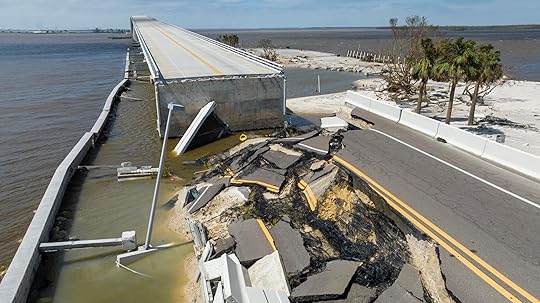 A section of the Sanibel Causeway was lost due to the effects of Hurricane Ian in Fort Myers, Fla. (Photo: Steve Helber/Associated Press)Thursday’s news on Hurricane Ian and its impact on various sectors of the freight industry from reports by the FreightWaves reporters and market experts, as well as pertinent social media posts. This file will be updated throughout the day as more news comes in, so please check back.
A section of the Sanibel Causeway was lost due to the effects of Hurricane Ian in Fort Myers, Fla. (Photo: Steve Helber/Associated Press)Thursday’s news on Hurricane Ian and its impact on various sectors of the freight industry from reports by the FreightWaves reporters and market experts, as well as pertinent social media posts. This file will be updated throughout the day as more news comes in, so please check back.Floridians are starting to assess the damage created by Hurricane Ian a day after it slammed into the Gulf Coast as a massive Category 4 storm. By Thursday morning, Ian had been downgraded to a tropical storm, but a threat remains as it continues to bring heavy winds and rain to the state.
As of 11:54 a.m. EDT, more than 2.6 million Floridians were without power, with some counties, including Hardee, almost completely in the dark.
Nearly 20% of Tampa gas stations have reported fuel shortage and access issues.
As previously reported, the logistics impacts could last for weeks — or longer.
Here’s the latest as of 11:30 a.m. EDT:
Roads and bridges
In a news conference Thursday morning in Tallahassee, Gov. Ron DeSantis said the Florida Department of Transportation (FDOT) is working to make sure roads and interstate highways are open.
Most of Interstate 75 remains open, according to FDOT, with some interruptions.
“Alligator Alley on I-75 across into Collier and Lee County is open and flowing,” DeSantis said. “I-75 south through Charlotte County is open and flowing. Portions of Lee County they are still looking at.”
Additionally, part of the Sanibel Causeway Bridge, a major bridge that connects Fort Myers to Sanibel Island, has been washed out.
…click on the above link to read the rest of the article…How To Make A Homemade Berkey Water Filter
If you’ve been at this survivalist stuff for any amount of time, you’ve probably know that the berkey water filtration system is among the best, if not THE best water filter available on the market. The problem is, they cost around $300. But what if I told you that you can make a homemade berkey water filter for less than $125? Would you want to know how to do it? Of course you would 
Follow this link to learn step-by-step…
Watch Live: Putin Declares Annexation Of Eastern Ukraine
Just ahead of a Friday ceremony declaring the official annexations of the four occupied Ukrainian regions which held controversial referendums, Russian President Vladimir Putin on Thursday signed two decrees which recognized the “independence” of Kherson and Zaporozhye regions.
“Recognize the state sovereignty and independence” of the Kherson and Zaporozhye regions “effective from the day of signing,” the two decrees stated. This paved the way for Friday’s ceremony where he’s expected to give a major speech which will incorporate those two territories plus Donetsk and Luhansk. WATCH Putin’s speech declaring annexation live:
According to Russian state media, “In the documents, Putin refers to the universally recognized principles and norms of international law, and the principle of equal rights and self-determination of peoples, enshrined in the UN Charter.”
In contrast to this Kremlin perspective, Western officials and media sources are slamming the big ‘land grab’ – which comes at a moment the entirety of these territories are not yet under Russian military control. A White House statement said in response to the “sham” referendums, “The United States will never recognize Ukrainian territory as anything other than part of Ukraine. Russia’s referenda are a sham – a false pretext to try to annex parts of Ukraine by force in flagrant violation of international law, including the United Nations Charter.”
Putin said in a televised meeting with officials on Tuesday as voting closed in the four regions: “Saving people in the territories where this referendum is taking place… is the focus of the attention of our entire society and of the entire country.”
…click on the above link to read the rest of the article…
Escobar: Nord Stream Sabotage Propels ‘Disaster Capitalism’ To New, Toxic Level
The sabotage of the Nord Stream (NS) and Nord Stream 2 (NS2) pipelines in the Baltic Sea has ominously propelled ‘Disaster Capitalism’ to a whole new, toxic level.
This episode of Hybrid Industrial/Commercial War, in the form of a terror attack against energy infrastructure in international waters signals the absolute collapse of international law, drowned by a “our way or the highway”, “rules-based”, order.
The attack on both pipelines consisted of multiple explosive charges detonated in separate branches close to the Danish island of Bornholm, but in international waters.
That was a sophisticated operation, carried out in stealth in the shallow depth of the Danish straits. That would in principle rule out submarines (ships entering the Baltic are limited to a draught of 15 meters). As for prospective “invisible” vessels, these could only loiter around with permission from Copenhagen – as the waters around Borholm are crammed with sensors, reflecting fear of incursion by Russian submarines.
Swedish seismologists registered two underwater explosions on Monday – one of them estimated at 100 kg of TNT. Yet as much as 700 kg may have been used to blow up three separate pipeline nodes. Such amount could not have possibly been delivered in just one trip by underwater drones currently available in neighboring nations.
The pressure on the pipelines dropped exponentially. The pipes are now filled with seawater.
The pipes on both NS and NS2 can be repaired, of course, but hardly before the arrival of General Winter. The question is whether Gazprom – already focused on several hefty Eurasian customers – would bother, especially considering that Gazprom vessels could be exposed to a possible NATO naval attack in the Baltic.
…click on the above link to read the rest of the article…
MuseLetter #349
Dear subscriber,
This month has seen the start of a historic and tragic invasion. In this month’s Museletter I’ve examined some of the Ukraine war’s likely implications for energy, economy, and geopolitics. Meanwhile, in a second piece Museletter maintains its gaze on an even bigger picture–what we humans are doing to the planet and how we might best shift our policies even at this late date to preserve a livable climate.
Best wishes to you, and peace to us all.
Richard
After the Ukraine Invasion: Sobering New Global Energy-Economic-Political Terrain
Russia’s invasion of Ukraine, and the West’s response, are ushering the world into a new energy, economic, and political era. In broad outline, this new era will have less-globally-integrated energy markets, and less-secure supplies of fossil fuels. Since energy is the irreducible basis of all economic activity, this translates to a precarious global economy and a likely reordering of national alliances. We are, in short, living through a moment that may be as politically and economically transformative as the World Wars of the 20th century, though with little likelihood of an outcome anywhere near as desirable as the boom decades of the 1920s or 1950s.
Energy
We begin with energy, since all else flows from it. The following would seem to be a small news item in comparison with other events and risks detailed further below, but it’s emblematic of the new era we’re entering.
Major oil companies, including ExxonMobil, Shell, and BP, have announced that they will cease collaborating with the Russian petroleum industry, which includes state-owned energy giants Lukoil and Gazprom…
…click on the above link to read the rest of the article…
September 29, 2022
US Embassy in Russia tells Americans to leave the country
The U.S. Embassy in Russia is urging Americans in the country to leave and warning U.S. citizens to not travel to Russia after Russian President Vladimir Putin ordered a call-up of 300,000 reservists to aid depleted forces in Ukraine.
The embassy said in a security alert on Wednesday that Russia may prevent U.S. citizens from leaving the country and conscript dual nationals into military service.
Russia may also refuse to acknowledge dual nationals’ U.S. citizenship or restrict their access to U.S. consular assistance, officials said.
Many flights booked up and prices soared after Putin announced a call-up of reservists for the first time since World War II. Russian forces have sustained heavy losses throughout the war, especially since Ukraine launched a counteroffensive earlier this month through which it has regained thousands of square kilometers of territory.
The U.S. Embassy said on Wednesday that flights are extremely limited and often unavailable on short notice but that overland routes by car and bus are still open. The embassy added that it is severely limited in its ability to help U.S. citizens and people should make independent arrangements as soon as possible.
The State Department maintains a page on its website to provide information on commercial travel out of Russia.
Officials also said U.S. citizens should remember that the right to peacefully assemble and freedom of expression are not guaranteed in Russia and they should avoid all social or political protests and not take pictures of security at the protests. Russian authorities have arrested Americans who have participated in the protests.
Protests popped up across Russia after Putin’s announcement, and police have detained hundreds of people.
The embassy also said in the security alert that U.S. citizens should carry proper identification, including a U.S. passport and current Russian visa, and have a contingency plan not reliant on U.S. assistance.
Peak Oil Has Finally Arrived. No, Really
Those who have called a top in oil may finally be proven right as sharp global rate hikes hurt consumption.
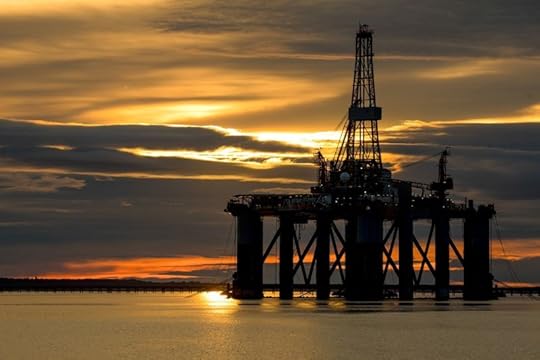 Is the sun setting on oil? Photographer: Jason Alden/Bloomberg
Is the sun setting on oil? Photographer: Jason Alden/BloombergI’ve rarely felt more trepidation about writing a column than this one. But here goes: After more than a century of almost continual growth, the world’s appetite for oil is peaking, and will soon enter terminal decline.
That’s hard to write, because those who’ve called a top in oil have a forecasting record on a par with film producer Harry Warner’s skepticism that people in the 1920s wanted to see talking pictures.
Running on EmptyLiquid fuels production isn’t expected to regain its peak levels of 102.2 million barrels a day this year or next
Source: Energy Information Administration
As far back as 1919, the chief geologist of the US Geological Survey wrote that domestic output — then running at about 960,000 barrels a day, about 6% of levels nowadays — would start falling within two to five years. In the 2000s, a dearth of oilfield discoveries led to febrile worries that supplies were running out, before the shale revolution prompted a surprise jump in production. BP Plc in 2020 predicted that consumption of liquid hydrocarbons would at best plateau for 15 years around the 97.9 million barrels a day mark it hit in 2019, before revising its forecast to a peak between the middle of this decade and 2030.
Through all that, oil demand has continued to grow as the indispensable energy carrier fueling rising global incomes and development. Still, the reserves of stamina that crude has called on to maintain its upward trajectory are finally giving out — and US Federal Reserve Chairman Jerome Powell may have just delivered the coup de grace.
…click on the above link to read the rest of the article…
September 28, 2022
The Rise of Public Health and ‘Green’ Police: Securitization Theory
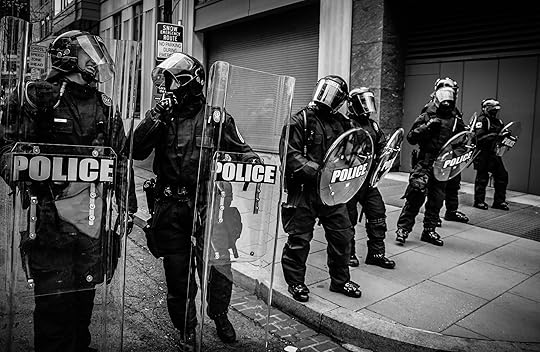
Policing has come a long way since the days of good ole boy Barney Fife.
Once upon a time, cops were tasked primarily with things like catching murderers and rapists and protecting property.
They were always used, of course, whenever necessary, to protect state interests – but, then again, the state’s interests weren’t always so obviously nefarious and illegitimate as they are today.
Law enforcement’s purview expansion is explained in large part by securitization theory.
As a result of the this process, peculiar new breeds of law enforcement – Public Health© officers and green police – have sprung up throughout the West.
Securitization theory: the advent of new security threats
The basic premise of securitization theory in political science is that, given the opportunity, a state will endlessly concoct new security “threats” as a justification to exercise greater power outside of the constraints of the normal political process:
“Securitisation theory shows us that national security policy is not a natural given, but carefully designated by politicians and decision-makers. According to securitisation theory, political issues are constituted as extreme security issues to be dealt with urgently when they have been labelled as ‘dangerous’… by a ‘securitising actor’ who has the social and institutional power to move the issue ‘beyond politics’.”
The process, in a nutshell, works like this:
The government identifies a new existential “threat,” either legitimate or overblown, either naturally occurring or cynically engineered by the state itself.The corporate media and corporate state stoke fear about the threat into the hearts and minds of a gullible publicIn the fog of panic, the state slyly provisions itself with new authority and resources to combat the threat, thereby increasing its powerThe threats change, but whether “domestic terrorism,” COVID-19, or climate change, the process largely remains the same.
…click on the above link to read the rest of the article…
Nord Stream Attack Updates
United States complicity seems increasingly to be an open secret.
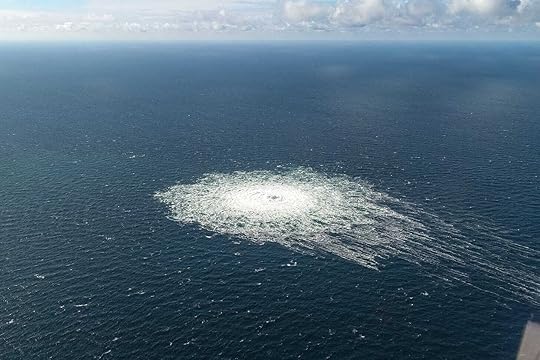
Radosław Sikorski, MEP, former Polish defence minister and husband of well-connected neoconservative intellectual Anne Appelbaum, has publicly thanked the United States for attacking the Nord Stream pipelines. Jim Geraghty, senior political correspondent for the American political journal National Review, has also praised the attacks in a brief piece called Who Will Rid Me of This Meddlesome Pipeline? He is proud that he has been arguing about the importance of taking Nord Stream 2 offline since February and suggests that the present attacks reflect his influence.
The biggest detail to break since I went to sleep yesterday, is this claim made by an anonymous intelligence source to Der Spiegel, that the CIA had warned Germany of Baltic pipeline attacks a few weeks ago:
The United States warned the German government weeks ago of possible attacks on gas pipelines in the Baltic Sea. According to information from SPIEGEL, a corresponding tip from the US intelligence service CIA was received in Berlin in the summer.
Several persons familiar with the matter confirmed this.
Even before the invasion of Ukraine, Nato partners had repeatedly pointed to suspicious activities of Russian ships over nodes of the underwater networks.
However, an initial analysis of satellite images from the area of the incidents showed only inconspicuous ship traffic at first glance, security circles said.
The Tagesspiegel has a longer piece today trying to come up with a plausible motive for Russia. They imagine that a Russian attack might have had the purpose of allowing Gazprom to escape contractual requirements to deliver gas through Nord Stream 1, thus driving European energy prices higher. Alternatively, they propose it might’ve been a ruse to circumvent sanctions for the repair of the pipeline. To even retype these theses is to reveal their infirmity.
…click on the above link to read the rest of the article…

